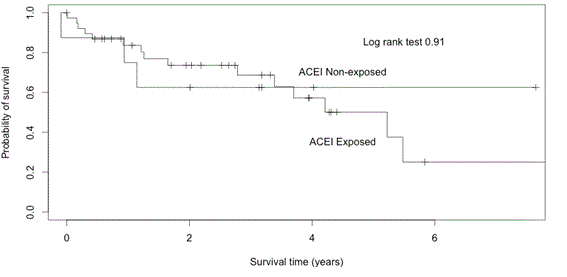Session Information
Date: Sunday, November 8, 2015
Title: Systemic Sclerosis, Fibrosing Syndromes and Raynaud's - Clinical Aspects and Therapeutics Poster I
Session Type: ACR Poster Session A
Session Time: 9:00AM-11:00AM
Background/Purpose: Scleroderma renal crisis (SRC) is a life-threatening complication of systemic sclerosis (SSc). Since the advent of angiotensin converting enzyme inhibitors (ACEI), the outcome of SRC has improved. There has also been more liberal use of ACEI to treat Raynaud’s phenomenon and systemic hypertension in SSc. There is some evidence suggesting that exposure to ACEI prior to the onset of SRC may be associated with worse outcomes. The objective of this study is to evaluate the risk of death in SSc patients with SRC who were and were not exposed to ACEI prior to the onset of SRC.
Methods: We conducted an international multicenter retrospective cohort study of incident SSc patients with SRC. The exposure was treatment with ACEI prior to SRC. The primary outcome was time to death. Cox proportional hazards models were used to estimate risk in those exposed and not exposed to ACEI prior to SRC expressed as hazard ratios (HR).
Results: More than 3000 SSc patients were screened to identify 48 incident SSc patients with SRC, with a mean age of 59.4 years. Forty-one (85.4%) were female, 41 (85.4%) had diffuse SSc and 19/27 (70.3%) had RNA polymerase III antibodies. Prior to SRC, 18 (39.1%) subjects had systemic hypertension, and mean creatinine was 78.5 umol/L. Eight (17.4%) patients were on an ACEI. Post SRC, 30 (63.8%) subjects had new hypertension, mean creatinine was 262.5 umol/L, and 41 (85.4%) were on an ACE inhibitor. Post SRC, there were 19 (39.6%) deaths, 3 (37.5%) in the ACEI exposed group and 16 (40%) in the ACEI non-exposed group. The probability of 1-year survival was 75.0% (95% CI 50.3%, 100%) in the ACEI exposed compared to 83.6% (95% CI 72.4%, 96.6%) in the ACEI non-exposed. Kaplan Meier analysis found no difference in survival curves (log rank test p=0.91). In the unadjusted model for survival, ACEI prior to SRC had a HR 0.93 (95% CI 0.27, 3.23). Adjusting for baseline hypertension, the HR for ACEI exposure was 0.73 (95% CI 0.19, 2.88). Interestingly, in the unadjusted model for survival, calcium channel blocker (CCB), exposure prior to SRC had a HR 1.12 (95% CI 0.43, 2.87). Adjusting for baseline hypertension, the HR for CCB exposure was 1.06 (95% CI 0.40, 2.78).

Conclusion: Exposure to ACE inhibitors prior to onset of scleroderma renal crisis was not associated with increased mortality. Some limitations of this study include the design, which may be associated with left truncation, and low power, as evidenced by the wide confidence intervals. Further international efforts will be required to definitely resolve this important clinical question.
To cite this abstract in AMA style:
Johnson SR, Elarabi M, Proudman S, Frech TM, Sahhar J, Stevens W, Zochling J, Ahmad Z, Baron M, Hudson M. Exposure to ACE Inhibitors Prior to Onset of Scleroderma Renal Crisis Is Not Associated with Increased Risk of Mortality in a Large Retrospective Cohort Study [abstract]. Arthritis Rheumatol. 2015; 67 (suppl 10). https://acrabstracts.org/abstract/exposure-to-ace-inhibitors-prior-to-onset-of-scleroderma-renal-crisis-is-not-associated-with-increased-risk-of-mortality-in-a-large-retrospective-cohort-study/. Accessed .« Back to 2015 ACR/ARHP Annual Meeting
ACR Meeting Abstracts - https://acrabstracts.org/abstract/exposure-to-ace-inhibitors-prior-to-onset-of-scleroderma-renal-crisis-is-not-associated-with-increased-risk-of-mortality-in-a-large-retrospective-cohort-study/
